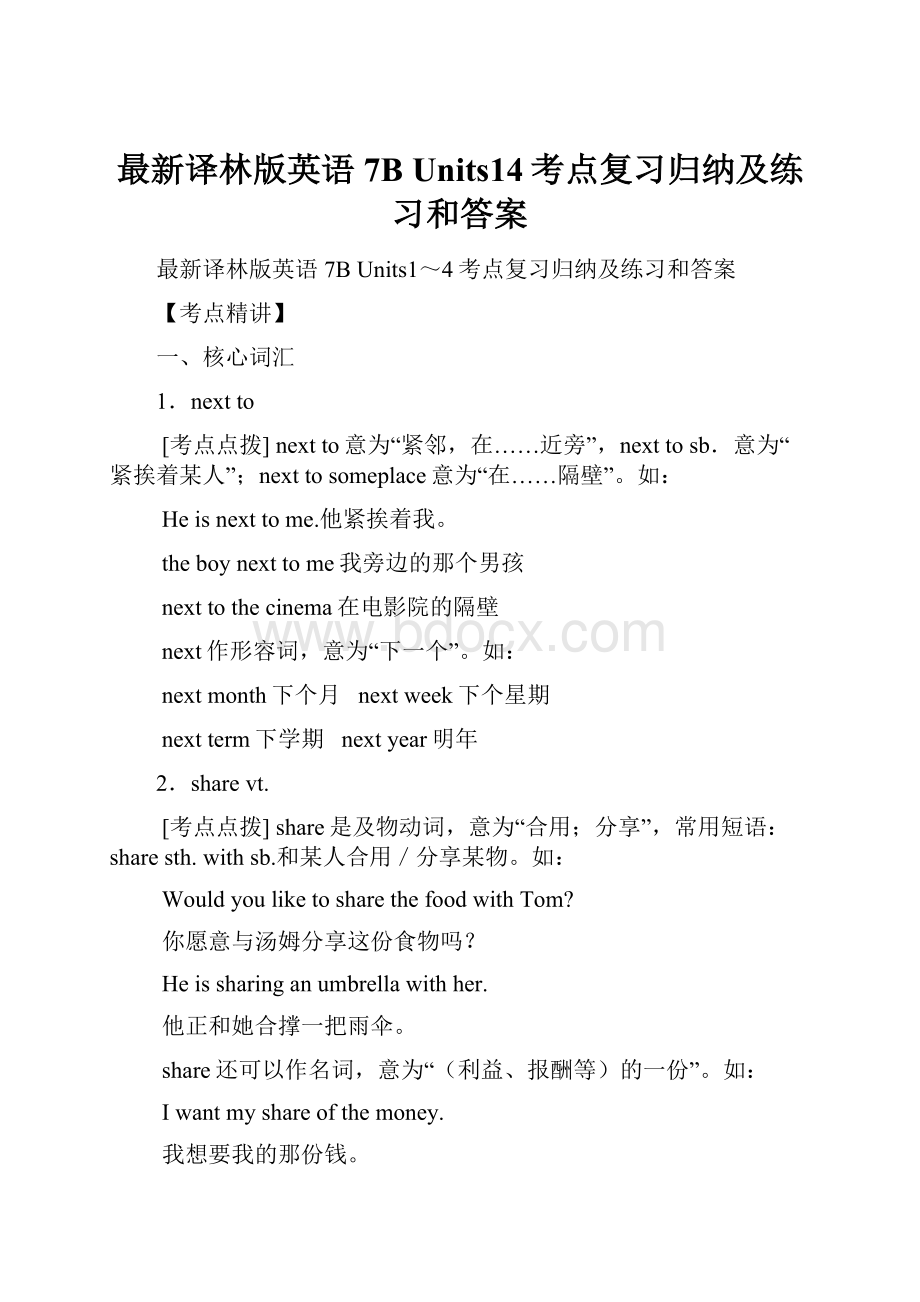最新译林版英语7B Units14考点复习归纳及练习和答案.docx
《最新译林版英语7B Units14考点复习归纳及练习和答案.docx》由会员分享,可在线阅读,更多相关《最新译林版英语7B Units14考点复习归纳及练习和答案.docx(23页珍藏版)》请在冰豆网上搜索。

最新译林版英语7BUnits14考点复习归纳及练习和答案
最新译林版英语7BUnits1~4考点复习归纳及练习和答案
【考点精讲】
一、核心词汇
1.nextto
[考点点拨]nextto意为“紧邻,在……近旁”,nexttosb.意为“紧挨着某人”;nexttosomeplace意为“在……隔壁”。
如:
Heisnexttome.他紧挨着我。
theboynexttome我旁边的那个男孩
nexttothecinema在电影院的隔壁
next作形容词,意为“下一个”。
如:
nextmonth下个月nextweek下个星期
nextterm下学期nextyear明年
2.sharevt.
[考点点拨]share是及物动词,意为“合用;分享”,常用短语:
sharesth.withsb.和某人合用/分享某物。
如:
WouldyouliketosharethefoodwithTom?
你愿意与汤姆分享这份食物吗?
Heissharinganumbrellawithher.
他正和她合撑一把雨伞。
share还可以作名词,意为“(利益、报酬等)的一份”。
如:
Iwantmyshareofthemoney.
我想要我的那份钱。
3.ownadj.
[考点点拨]own既可作形容词也可作动词:
(1)own作形容词时,意为“自己的”。
如:
herownbag她自己的包
theirownbikes他们自己的自行车
haveone'sown…意为“拥有某人自己的……”,可换成havesth.ofone'sown。
如:
Shehasherowncar.=Shehasacarofherown.
她有自己的小汽车。
(2)own还可用作动词,意为“拥有”,相当于have。
如:
Iownanewcomputernow.
=Ihaveanewcomputernow.
现在我有一台新电脑了。
Doesheownahousewithabiggarden?
=Doeshehaveahousewithabiggarden?
他有一座带有大花园的房子吗?
4.invitevt.
[考点点拨]invite意为“邀请”,invitesb.todosth.意为“邀请某人做某事”。
如:
inviteyoutocometomybirthdayparty
邀请你来参加我的生日聚会
5.likeprep.
[考点点拨]like意为“像……”,是介词,常与连系动词或be动词连用,即look/sound/feel/smell/taste/belike。
如:
Mybrotherislikemyfather.
我弟弟像我父亲。
like还可以表示列举的含义,相当于suchas。
如:
Idomanysportslikerunningandswimming.
我做很多运动,像跑步和游泳。
like也可作动词,意为“喜欢”。
如:
She,likehermother,likessinging.
她像她的妈妈一样喜欢唱歌。
6.problemn.
[考点点拨]problem意为“问题,难题”,指说话者认为难以解决的问题,它与动词solve或settle(解决)搭配;而question指说话者需要寻找答案的问题,它常与动词ask或answer连用。
如:
Theproblemisdifficulttobesolved.
这个问题很难解决。
MayIaskyousomequestions?
我可以问你一些问题吗?
haveaproblemwithsth在某事上有问题
haveaproblem(in)doingsth
=havetrouble(in)doingsth.
做某事有困难
7.personn.
[考点点拨]person与people的区别:
people作“人”讲时,是集体名词,表复数概念。
说“一个人”时,不用people,当表示两个或两个以上的人时,可用people。
如:
twentypeople20个人。
people作“民族”讲时,有单、复数之分。
如:
apeople一个民族
Thereare56peoplesinChina中国有56个民族。
person是个体名词,它泛指man,woman或child中的任何一个,其复数形式是persons,但人们习惯用people代替persons。
“一个人”常译作aperson,而需要说明一个人的性别时,要用aman或awoman来表示。
8.elderadj.
[考点点拨]old是指普通意义上“年老的;旧的,古老的”;elder意为“年纪较长的”,指家人之间表明长幼关系,反义词为younger。
如:
theoldmen老人
elderbrother/sister哥哥/姐姐
youngerbrother/sister弟弟/妹妹
9.futuren.
[考点点拨]future意为“将来”,inthefuture通常指在将来的某一时间,意为“在将来”。
infuture指将来的全部,意为“从今以后(fromnowon)”,也可用forthefuture代替。
10.soundlinkingv.
[考点点拨]sound意为“听起来”,为连系动词,后接形容词。
sound还可作名词,指声音的总称。
voice指人的说话声、嗓音;noise指噪音(不可数名词),可用much,alotof或alittle等词修饰;也可作可数名词。
二、核心句型
1.Ilovetositthereandlookoutatthebeachandthesea.
我喜欢坐在那儿并朝外看海滩和大海。
[考点点拨]lookout意为“向外看”;lookoutatthebeach向外看海滩;lookoutofthewindow朝窗外看。
lookout还可意为“当心,小心”,相当于becareful/takecare。
2.Heisalwaysthefirsttocometoschoolinourclass.
他总是我们班第一个到学校的。
[考点点拨]tocometoschool是不定式短语,在句中作定语,修饰前面的thefirst。
不定式作定语放在被修饰词的后面。
如:
Sammyisalwaysthefirsttogohome.
萨米总是第一个回家。
3.MayIspeaktoDaniel,please?
请找丹尼尔接电话,好吗?
[考点点拨]打电话时的常用语:
ThisisDaniel(speaking).我就是丹尼尔。
Who'scalling,please?
请问你是哪位?
“我就是丹尼尔”不能说成:
I'mDaniel.
“请问你是哪位”不能说成:
Whoareyou?
4.I'mafraidtheywon'twelcomevisitorslikeyou.
我恐怕他们不会欢迎像你这样的客人。
[考点点拨]“I'mafraid+that从句”意为“我恐怕……”,引出不好的消息或带有歉意的回绝;“I'mafraidso/not.”表示对上文情况的肯定或否定。
如:
-Willhecometoday?
他今天会来吗?
-I'mafraidso/not.
恐怕会/不会吧。
beafraidtodosth害怕做某事(因害怕而不敢做)
beafraidofdoingsth害怕做某事(担心可能发生某事)
5.I'mgoingtoaskacomputerengineertocheckit.
我打算找个电脑工程师检查一下。
[考点点拨]ask的用法:
(1)意为“要求,请求”时,常用结构为asksb.(not)todosth要求/请求某人(不要)做某事,一般情况下可换成tellsb.(not)todosth。
如:
MyteacherasksmetoclosethedoorbeforeIgohome
=MyteachertellsmetoclosethedoorbeforeIgohome.老师叫我在回家之前把门关上。
MyparentsaskmenottowatchtoomuchTV.
=MyparentstellmenottowatchtoomuchTV.
我父母叫我不要看太多的电视。
(2)意为“询问”时,反义词是answer。
如:
Tomoftenasksquestionsinclass.
汤姆常常在课堂上问问题。
(3)意为“请求”时,常用结构为ask(sb.)forsth.请求(某人)得到某物。
如:
Youcanask110forhelpwhenyouhavetrouble.
当你有麻烦时,你可以向110请求帮助。
Don'taskyourparentsfortoomuchmoneytobuysnacks.不要向你父母要太多的钱买零食。
6.Iwanttohelpsickpeople.我想要帮助病人。
[考点点拨]sick作形容词,用法如下:
(1)意为“病的”,此时sick的同义词为ill。
besick=beil1。
如:
Jackdidn'tcometoschoolbecausehewassick/ill.
杰克没来上学,因为他病了。
sick能作定语修饰名词,但ill不能。
如:
一个生病的男孩,要说成asickboy,而不能说成anil1boy(坏小子)。
(2)意为“恶心的”。
如:
Pleaseopenthewindow.Ifeelalittlesick
请把窗户打开。
我感觉有点恶心。
(3)意为“厌烦”,常用结构为besickof…,意为“厌烦……,腻烦……”。
如:
Iamsickofreadingthesamebookeveryday.
我厌倦了每天都读同一本书。
三、重点语法
1.基数词、序数词的用法
表示数目多少的数词叫作基数词,如one,two,three;表示顺序先后的数词叫作序数词,如first,second,third。
(1)基数词的读写
①读写的关键是“几百几十几”。
百位与十位之间用and连接,十位与个位之间加连字符。
如:
365threehundredandsixty-five
403fourhundredandthree
②当读写超过百位的数时,阿拉伯数字从个位起用三位分段方式,以便读写(常用逗号分段)。
从右往左第一个逗号读thousand,第二个逗号读million,第三个逗号读billion(十亿)。
各逗号后的三位数遵循“几百几十几”的规则读写。
如:
7,321seventhousand,threehundredandtwenty-one
1,561,074onemillion,fivehundredandsixty-onethousandandseventy-four
(2)序数词的读写
①序数词一般在基数词词尾加-th。
序数词的拼写口诀:
序数词尾th,开头三数属特例,八少t,九减e,整十改y为ie,ve结尾变f,牢记十四,四十四。
如first,second,third,fourth,fifth,eighth,ninth,twelfth,twentieth,fortieth。
“第几十几”用“基数词(整十)+序数词”合起来表达。
如:
第二十一twenty-first
②一般情况下,序数词前要加the。
年、月、日表达方法:
“年”用基数词表示,“日”用序数词表示,“年”放在最后。
如:
1999年10月1日October1st,1999/thefirstofOctober,nineteenninety-nine
Wearelivinginthetwenty-firstcentury.
我们生活在21世纪。
(3)英语中没有“万”这一单位,“万”也用thousand表示。
如:
tenthousand(10,000),onehundredthousand(100,000)。
当hundred,thousand,million与of连用时,其后要加-s,分别表示“数百的”“成千上万的”“数百万的”。
2.一般将来时
(1)shall常用于第一人称,will常用于第二、三人称。
在许多情况下,will可以代替shall。
但并不是所有情况下will都可以代替shall:
①在征求别人的意见时,will不能代替shall。
如:
Shallwegooutforapicnicnextweek?
我们下周去野餐好吗?
②will和shall的缩写形式相同,都是“ll”,其否定形式shallnot和willnot的缩写形式分别是shan't和won't。
缩写形式通常用于非正式场合。
如:
Weshallhaveatestnextweek,shan'twe?
我们下周将进行一次测试,好吗?
Theywon'tcomeherenextSunday.
他们下周日不会来这儿。
(2)will与begoingto
①will表示说话人认为、相信、希望或假定要发生的事,不含任何具体时间,可以指遥远的将来;而begoingto指有迹象表明某事即将发生或肯定会发生,通常表示很快就要发生的事情。
如:
Youwillsucceedinthefuture.你将来会成功。
Listentothewind.Itisgoingtorain
听风声,马上就要下雨了。
②will和begoingto均可表示“意图”,但事先考虑过的意图用begoingto,不是事先考虑的意图用will。
如:
-Whyareyoueatingsofast?
你为什么吃这么快?
-Iamgoingtoseeafilm.Imaybelate.
我要去看电影。
我可能会迟到。
Iwillhelpyou.我会帮你。
③begoingto可以用在条件状语从句中,而will不可以。
如:
Ifyouaregoingtoattendthemeeting,you'dbetterleavenow.如果你要去参加会议,你最好现在就离开。
【考点精练】
()1.-Willyougotothecinemawithmetomorrow?
-Sorry,I_______skatingwithTom.
AgoB.wentC.havegoneD.willgo
()2.There_______anEnglishcontestnextterm
AisgoingtohaveB.isgoingtobe
C.willhaveD.willtobe
()3.TheWaterParkisagoodplace_______.
AtohavefunB.havefun
C.havingfunD.tohaveafun
()4.Whenyoumovesomewherenew,thefirstthingforyouistofindaplace_______.
A.toliveB.livingin
C.tolivingD.livein
()5.-Hello,mayIspeaktoJohn,please?
-_______.
A.Whoareyou?
B.What'sthematter?
C.ThisisJohnspeaking.D.HeisJohn
()6.Thistallbuildinghas_______floors.AndTonylivesonthe_______floor.
Atwelve;twelveBtwelfth;twelfth
C.twelfth;twelveD.twelve;twelfth
()7.-Whyareyouinsuchahurry,John?
-There_______anNBAbasketballgameintenminutes.
A.willbeBwasC.wouldbeD.hasseen
()8.Ifyou_______tomorrow,Iwillletyouknowallaboutit.
A.willcomeB.comeC.cameD.comes
()9.-Let'sgototheWaterPark.
-That_______great!
AhasB.tastesCfeelsD.sounds
()10.Jimmyhassixteenbrokenbikesto_______andgiveawaytokidswhodon'thavebikes.
AlookupBsetupCputupD.fixup
()11.—HowmuchdoyouknowaboutTaiwan,LiFen?
—Taiwanandthemainlandhavealotincommon.Theyalotofhistoryandculture.
A.supportB.explainC.shareD.belong
()12.—There________abasketballgameinourschooltomorrow.—Great!
A.isgoingtohaveB.willbeC.beD.willhave
()13.—Hello!
ThisisDavid.CanIspeaktoTom?
—Yes,___________.
A.TomismeB.ThisisTomspeaking.
C.IamTomD.MynameisTom.
()14.—Three-Dprintingtechnologycouldbeusedtobuildahouseinlessthan24hours.
—It amazing.It'smyfirsttimetogettoknowthenews.
A.looksB.smellsC.soundsD.tastes
二、根据句意及中文提示完成单词
1.Openyourbooksandturntothe_______(第二十)page,thenreadthetexttogether.
2.Dannywill_______(邀请)hisfriendstohisbirthdayparty.
3.Therearenearlyfour_______(百)studentsinourschool.
4.Decemberisthe_______(第十二)monthoftheyear.
5.I'm_______(恐怕)mybrotherwillnotdohishomeworkathomethisevening.
6.Alexiscrazyaboutcomputer.Hewantstobeacomputer(工程师)inthefuture.
三、用所给单词的适当形式填空
1.We'llhaveasurprisepartyformymother's_______(forty)birthdaynextSaturday.
2.Ineedtogotothelibrary,andifIposttheletterontheway,I'llbekillingtwobirdswith_______(first)stone.
3.Eachyear,_______(thousand)ofvisitorscometoHuai'antoenjoyHuaiyangfood.
4.There_______(be)somemeetingsnextweek
5.Who_______(teach)youChinesenextterm,Millie?
6.Thereisgoingto_______(is)alotofrainnextmonth.
7.Thisismy_______(eight)timetoseethesinger.
8.Couldyoutellmethetime?
Mywatchis_______(break).
9.Therearealotof_______(volunteer)atthecentre.
10.Readingandwritingaretwodifferent_______(skill).
7BUnits3~4考点复习归纳
【考点精讲】
一、核心词汇
1.nothingpron.
[考点点拨]nothing意为“没有什么”,相当于notanything。
如:
Look!
Thereisnothinginthebowl.
看!
碗里什么也没有。
Thereisnothinginthefridge.冰箱里什么都没有。
2.famousadj.
[考点点拨]famous意为“著名的,出名的”。
befamousfor意为“以……而出名”。
如:
ChinaisfamousfortheGreatWall.
中国以长城而出名。
befamousas意为“作为……而出名”。
如:
LiYuchun